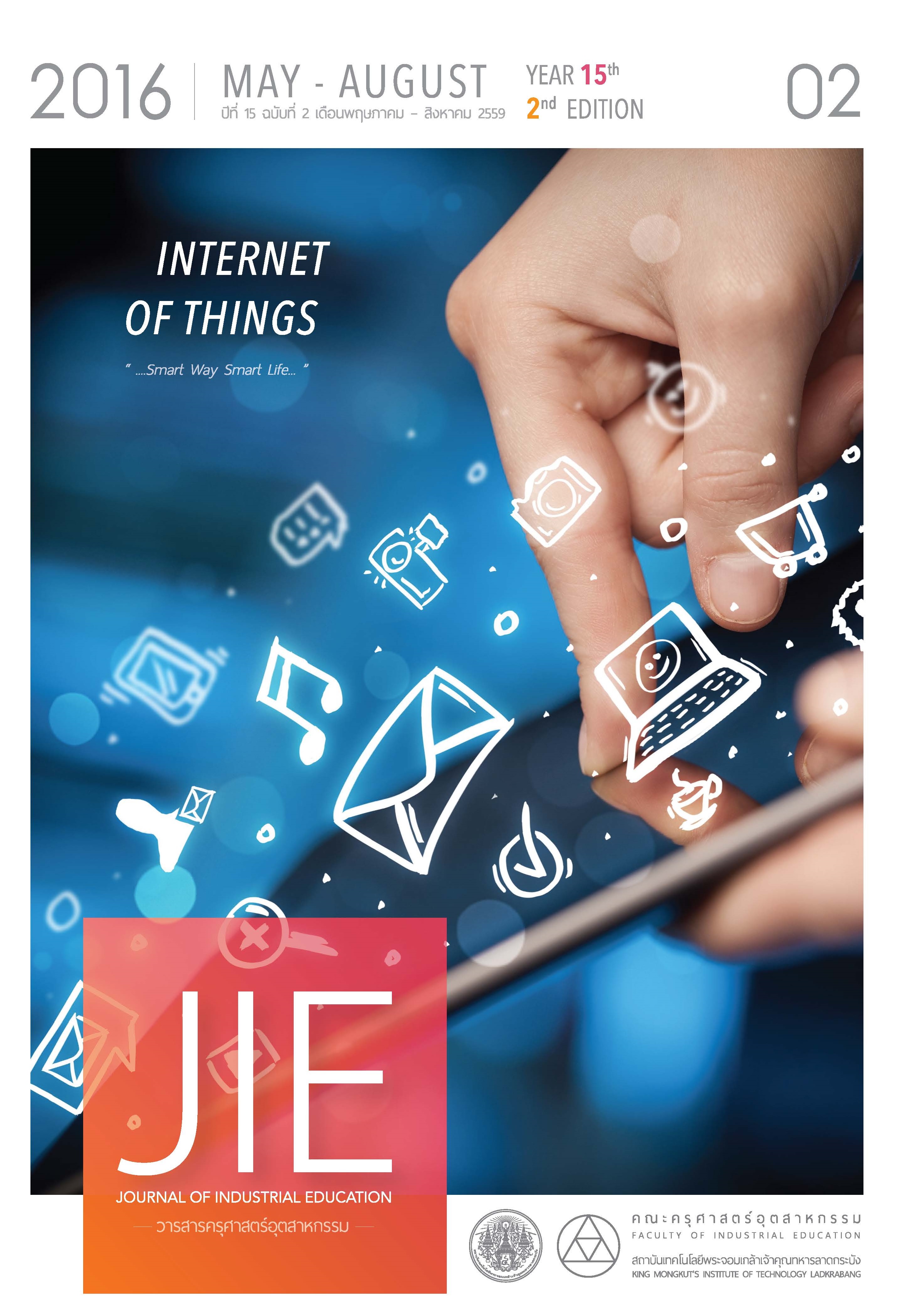TABLET-BASED LEARNING ABOUT BASIC SEMI-CONDUCTOR DEVICES
Keywords:
Tablet, Tablet- Based Learning, Semi-Conductor Devices, Efficiency, AchievementAbstract
The research objectives was to develop tablet-based learning about basic semi-conductor devices, and to determine its efficiency by comparing pretest and posttest scores of student learning achievement. The sample for this study consisted of 30 first year vocational certificate students majoring in electronics from Eastern Technological College (E.TECH) during the second term of the 2558 academic year. The tools utilized in the research were tablet-based learning tasks on basic semi-conductor devices, quality evaluation of the contents and multimedia production techniques, and a learning achievement test.
The results revealed that the quality of the contents was at the great level (= 4.63, S.D. = 0.40) and multimedia production was at the good level (
= 4.47, S.D. = 0.53). The efficiency of tablet-based learning about basic semi-conductor devices or E1/E2 was 84.07/83.53, which was congruent with the specified hypothesis. When the pretest and posttest scores of student learning achievement were compared, it was found that the posttest scores (
= 41.77, S.D. = 3.02) were statistically significantly higher than the pretest ones (
= 24.73, S.D. =4.37) at the 0.05 level.
References
Anukulwech,A. 2013. Competency Based Skill Training on Testing Basic Semiconductor Devices. Master Thesis of Science in Industrial Education (Electrical Communication Engineering) Faculty of Industrial Education King Mongkut's Institute of Technology Ladkrabang.
[2] สุรศักดิ์ ปาเฮ. 2555. แท็บเล็ตเพื่อการศึกษาโอกาสและความท้าทาย. [ออนไลน์].เข้าถึงได้จาก:https://www.kan1.go.th/tablet-for-education. pdf (วันที่สืบค้นข้อมูล: 8 สิงหาคม 2558).
[3] ปรัชญา เนียมทอง และ จงกล แก่นเพิ่ม. 2557. การพัฒนาหนังสืออิเล็กทรอนิกส์บนแท็บเล็ต เรื่องตัวต้านทานและการอ่านค่าสีสำหรับผู้เรียนระดับชั้นมัธยมศึกษาปีที่ 3.[ฉบับอิเล็กทรอนิกส์]. วารสารเทคโนโลยีการศึกษา และมีเดียคอนเวอร์เจนซ์, 1(1),น.99-107.เข้าถึงได้จาก: https://edtech.tsu.ac. th/etmc/ ejournalVol1/ article8_01_2014.pdf(วันที่สืบค้นข้อมูล: 8 สิงหาคม 2558).
[4] ณัฐกร สงคราม. 2553. การออกแบบและพัฒนามัลติมีเดียเพื่อการเรียนรู้. กรุงเทพฯ: สำนักพิมพ์ แห่งจุฬาลงกรณ์มหาวิทยาลัย.
[5] ชัยยงค์ พรหมวงศ์ และคณะ. 2521. ระบบสื่อการสอน.กรุงเทพฯ: สำนักพิมพ์จุฬาลงกรณ์มหาวิทยาลัย.
[6] นันท์ภัส สิทธิวัฒน์กุลธร อรรถพร ฤทธิเกิด และฉันทนา วิริยเวชกุล. 2558. บทเรียนคอมพิวเตอร์ช่วยฝึกทักษะเน้นฐานสมรรถนะ เรื่องการประกอบวงจรอิเล็กทรอนิกส์. วารสารครุศาสตร์อุตสาหกรรม, 14(1),น.185-190.
Sittiwatkulatorn, N. Ridhikerd, A. & Viriyavejakul, C. 2015. Computer - based skill competency on electronics circuit assembly. Journal of Industrial Education,14 (1), p.185-190.
[7] ภัสรา ศรีกลับ. 2557. การพัฒนาบทเรียนคอมพิวเตอร์ช่วยสอนผ่านเครือข่ายอินเตอร์เน็ตเพื่อทบทวน เรื่อง การสร้างเว็บเพจ. วิทยานิพนธ์วิทยาศาสตรมหาบัณฑิต สาขาวิชาการศึกษาวิทยาศาสตร์ (คอมพิวเตอร์) คณะครุศาสตร์อุตสาหกรรม สถาบันเทคโนโลยีพระจอมเกล้าเจ้าคุณทหารลาดกระบัง.
[8] พรรณี ลีกิจวัฒนะ. 2551. วิธีวิจัยทางการศึกษา. พิมพ์ครั้งที่ 3 กรุงเทพฯ: คณะครุศาสตร์อุตสาหกรรม สถาบันเทคโนโลยีพระจอมเกล้าเจ้าคุณทหารลาดกระบัง.
[9] เทวัญ กั้นเขตต์. 2555. การพัฒนาบทเรียน คอมพิวเตอร์มัลติมีเดียร์บนแท็บเล็ต เรื่องสนุกคิดคณิตศาสตร์สำหรับผู้เรียนชั้นประถมศึกษาปีที่ 1. วิทยานิพนธ์วิทยาศาสตรมหาบัณฑิต สาขาวิชาการศึกษาวิทยาศาสตร์ (คอมพิวเตอร์) คณะครุศาสตร์อุตสาหกรรม สถาบันเทคโนโลยี พระจอมเกล้าเจ้าคุณทหารลาดกระบัง.
[10] นันทรัตน์ กลิ่นหอม เลิศลักษณ์ กลิ่นหอม และฉันทนา วิริยเวชกุล. 2555. การพัฒนาบทเรียน ผ่านเครือข่ายอินเทอร์เน็ตเพื่อการทบทวน เรื่องระบบเครือข่ายคอมพิวเตอร์วิชาเทคโนโลยีสารสนเทศเบื้องต้น. วารสารครุศาสตร์อุตสาหกรรม, 11(2),น.48-54.
Klinhom, N. Klinhom, L & Viriyavejakul, C. 2012. Development of Web-Based Instruction for Review on Computer Network in Fundamental Information Technology Subject. Journal of Industrial Education, 11 (2), p.48-54.
[11] ภาณุมาศ นักษัตรมณฑล. 2556. การพัฒนา เลิร์นนิ่ง ออบเจ็คต์ วิชาคณิตศาสตร์บนแท็บเล็ต เรื่องรูปสามเหลี่ยม สำหรับผู้เรียนชั้นประถมปีที่ 5. วิทยานิพนธ์ศึกษาศาสตรมหาบัณฑิตสาขาเทคโนโลยี และสื่อสารการศึกษามหาวิทยาลัยเกษตรศาสตร์.
Downloads
Published
How to Cite
Issue
Section
License
"The opinions and contents including the words in papers are responsibility by the authors."
"ข้อคิดเห็น เนื้อหา รวมทั้งการใช้ภาษาในบทความถือเป็นความรับผิดชอบของผู้เขียน"



